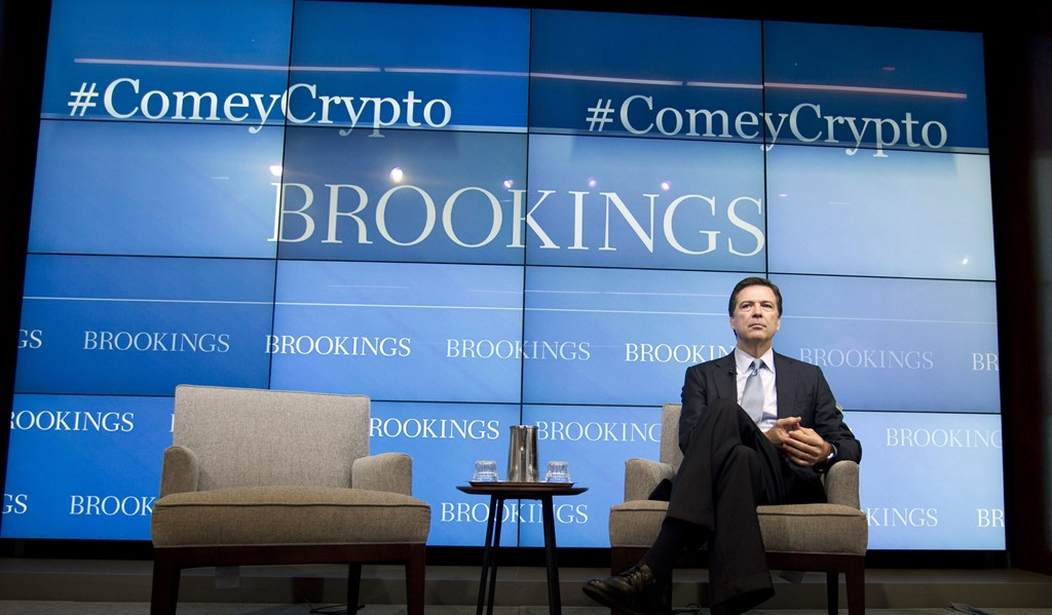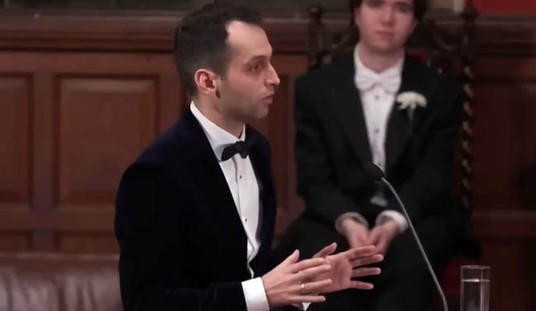Podcasters now have a target on their back, thanks to the Brookings Institution.
It was bound to happen. Joe Rogan was targeted when he broke with The Narrative. But as the biggest podcaster in the world, he was able to bull his way through the cancel culture mob. As with J.K. Rowling, it helps to have hundreds of millions of dollars to help you weather the storm.
But most podcasters aren’t so fortunate. They are hanging on by their fingernails, fighting for listens, and desperate to monetize their content. The last thing they need is the Establishment labeling them foreign agents or spreaders of “misinformation,” cutting off their ability to make money and/or share their opinions.
The danger? Podcasters can “say what they want.” It’s a national crisis!
In February 2021, Texas Senator Ted Cruz and his co-host Michael Knowles, a Daily Wire commentator, recorded a live episode of theVerdict With Ted Cruz podcast.1 In conversation about his former Senate race opponent Beto O’Rourke, the Texas Republican described his rival’s support base as primarily reporters who act like “groupies at a Rolling Stones concert throwing their underwear.” Offhandedly, he added, “If they wore underwear, yes.” With a smirk, he leaned into the microphone and asked Knowles, “Too edgy?” Knowles replied, “It’s a podcast: you can say whatever you want!”
Since the advent of the medium, podcasts have generally offered a space where, in the words of Knowles, ‘you can say whatever you want.’ Once written off as a dying medium, podcasting has undergone rapid growth and monetization, while largely avoiding content moderation and regulatory debates.2 Today, nearly 41% of Americans listen to podcasts monthly, and almost one in four Americans look to podcasts for their news.3 Globally, the medium is projected to reach an audience of 504.9 million by 2024, while ad revenue in the United States is expected to double between 2022 and 2024, jumping from $2 billion to $4 billion.
Due in large part to the say-whatever-you-want perceptions of the medium, podcasting offers a critical avenue through which unsubstantiated and false claims proliferate. As the terms are used in this report, the terms “false claims,” “misleading claims,” “unsubstantiated claims” or any combination thereof are evaluations by the research team of the underlying statements and assertions grounded in the methodology laid out below in the research design section and appendices
They literally do think that allowing people to “say whatever they want” is a crisis. A “research team”–Brookings’ version of “fact checkers”–gets to determine what the truth is.
Truths like “masks don’t work” and then “masks do work” and “you won’t get infected if you are vaccinated” and then “well you will get infected but that’s OK”… and on and on.
The truth is whatever the “fact checkers” claim. Shut up and leave it to Brookings’ researchers, who find it appalling that Ted Cruz can make a joke about underwear on a podcast. Ted Cruz gets Four Pinnochios for claiming that rock groupies don’t wear underwear!
Using a combination of analytical methods – including natural language processing, machine learning, and manual classifying – this research provided the first overarching assessment of the role that popular political podcasting plays in spreading unsubstantiated and false claims. These podcasters, who span the political spectrum, make up the mainstream of the medium and regularly boast audiences in the millions. Drawing on data collected from 36,603 episodes produced by 79 prominent political podcasters, 17,061 evaluations, and 184 key terms and phrases, this analysis found:7
- The spread of unsubstantiated and false claims across the popular political podcasting ecosystem was common: Nearly 70% of podcasters in the dataset shared one or more such claim, and at least one out of every 20 episodes (1,863 episodes) recorded by prominent podcasters featured an unsubstantiated or false claim. Due to the conservative nature of the research design, this is likely an undercount of the proliferation of this type of content across political podcasting.
- Unsubstantiated and false claims tied to the 2020 US presidential election spiked dramatically after the election and did not abate in the following months, despite multiple failed legal challenges: In the lead up to the January 6 attack on the US Capitol, political podcasters played a central and highly partisan role in sowing doubt about the security of the 2020 election. After Election Day, claims of election fraud rose by nearly 600%, to more than 28% of all episodes airing between the election and January 6, 2020, with the vast majority coming from conservative series that were among the most popular during this period.
- During the first two years of the coronavirus pandemic, unsubstantiated and false claims circulated widely, but they tended to be more nuanced and less partisan than election-related claims: Unsubstantiated and false claims tied to the pandemic featured in one out of every eight episodes examined during this period. These claims, however, tended to be less overtly partisan and were often rooted in misunderstandings of science, confusion over evolving public health guidelines, and a heavy reliance on non-peer reviewed preprints.
- 10 prominent podcasters were responsible for sharing the majority of false and misleading content: The 10 podcast series that shared unsubstantiated or false claims at the highest overall rates accounted for more than 60% of all the dataset’s unsubstantiated and false claims. These series, whose hosts lean conservative politically, had a combined reach of more than 28 million followers on Facebook and Twitter as of September 2022.8
Keep in mind, “unsubstantiated” means “ideas we don’t like or don’t believe.” Claims that a porous cloth mask will protect you from a respiratory virus are substantiated because some bureaucrat at the CDC or NIAID wants you to believe it, despite all the reams of evidence to the contrary.
“Substantiated” simply means what they want you to believe. “Unsubstantiated” means the opposite. That’s all.
Fine, whatever. Watch any TV news show from either end of the ideological spectrum and you will find this sort of content 100% of the time. For God’s sake, the New York Times and Washington Post got Pulitzer Prizes for spreading misinformation on the Steele Dossier. But it was the right kind of misinformation, so it was actually “substantiated.”
John has been doing an excellent series on the Columbia Journalism Review’s series on how badly the MSM covered the Russiagate story. CJR was scathing in its criticism of the MSM. The review was done by a former NYT reporter and it eviscerates his old employer and others over how ridiculous and deceptive their coverage was.
So don’t tell me about any establishment-type concerns about disinformation. They are perfectly fine with it as long as it confirms their priors.
There are plenty of good podcasts, plenty of awful ones, and plenty that engage in fanciful or ridiculous speculations.
So what? Honestly. So. F’ing. What?! Since when do we empower somebody in the Establishment to decide what can be said or not by anybody? If I had my way Russia Today would be on cable channels, Al Jazeera would be available, and the Iranian Mullahs could spread their lies freely. Not because I like or agree with them, but because it’s speech. The more ideas the better.
Liberalism–by that I mean classical liberalism–can withstand criticism. The best remedy to false speech is true speech. Is it perfect? No. But at least all the different wanna-be tyrants are fighting with each other as well as trying to suppress our own thought.
And that is precisely why they want to suppress others’ speech. So that we can’t call out their falsehoods or bad ideas. And they don’t have to defend themselves against competing power blocs.
The Brookings report is long, boring, and often full of BS, but the bottom line is clear: “moderation” by Big Tech. Develop the tools to suppress speech and then enforce them against the malefactors.
Since the early years of podcasting, apps have taken a hands-off approach to moderating content and have provided a sparse architecture to facilitate distribution. As the medium continues to evolve and expand, the tech companies that develop podcasting apps can help shape the information ecosystem in important ways by crafting more robust content moderation guidelines and practices, promoting greater transparency, and improving the in-app experience for users.
It’s the kind of moderation power they already have over Facebook and had over Twitter. The power to shut people up on a whim, courtesy of the podcast apps we use.
It won’t be the government–just their agents at Apple and Google doing the dirty work for them. That’s constitutional, right?









